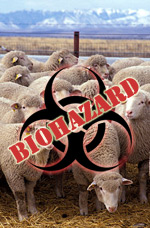Workers only paid $750/month to live in extremely isolated conditions and are exposed to many dangers
 Public Lands sheep grazing not only creates conflict with bighorn sheep, wolves, grizzly bears, black bears, mountain lions, coyotes, numerous other wildlife species, habitat degradation, weed proliferation, human conflict with guard dogs, and disease spread, it is responsible for the exploitation of migrant workers who “don’t speak English, don’t know where they are, and depend entirely on their employers for food, water and contact with the outside world.”
Public Lands sheep grazing not only creates conflict with bighorn sheep, wolves, grizzly bears, black bears, mountain lions, coyotes, numerous other wildlife species, habitat degradation, weed proliferation, human conflict with guard dogs, and disease spread, it is responsible for the exploitation of migrant workers who “don’t speak English, don’t know where they are, and depend entirely on their employers for food, water and contact with the outside world.”
A job search for the word “herder” brings up a list of 10 jobs in Idaho and Wyoming which pay $750/month except for the job in Wyoming which pays $650/month.
https://labor.idaho.gov/idahoworks/es/jobsearch/default.aspx
There is another, less talked about, issue relating to sheepherders. Q-fever, which is carried by sheep, is known to cause infections in humans and possibly result in death. The spores can persist in the environment for years and people and livestock can become infected by breathing dust. These immigrant workers are disproportionally exposed to Q-fever and are at risk of becoming infected.
Advocates push change in working conditions for isolated immigrant sheepherders
IVAN MORENO
Associated Press Writer in the LA Times

Comments
Sheepherders, like cowboys, are celebrated in American movie culture — all the bull about the “real West.”
In reality both are exploited by the land barons.
Ralph, if I read this right, Mr. Cruz stated that he makes more money here then at home and that he managed to put 2 kids thru college with his earnings. So what we want to do is take this guy and make him so expensive that he won’t be offered this work in the future? I agree there should not be abuse but I see nothing here that documents that. He took the job voluntarily, it was a better job than he could get at home and by this account his employer lived up to the deal they made. I sure hope that all the biologists, rangers and wardens in the field don’t start demanding hot water, port-potties, outside socialization opportunities and more than a 1 room abode while in the field.
“We couldn’t survive without these men,” said Anthony Theos, a rancher and president of the Colorado Wool Growers Association.
Theos Swallow Fork Ranches received payments totaling $393,435 from 1995 through 2006
http://farm.ewg.org/farm/persondetail.php?custnumber=009387028
I guess they need lots and lots of taxpayer money too.
If you need this many subsidies to survive then maybe you should be called a welfare rancher.
FYI, I wrote the above post.
Mikepost,
Couldn’t the same be said of child labor before it was outlawed– that the kids took the jobs voluntarily and it allowed families to save money?
Sometimes society has to step in with regulation to cut off the race to the bottom. While it may have some short-term adverse effects, the long-term effects would be to raise the wages.
I honestly think most biologists and rangers have much better accommodations than those tiny tin sheep shacks. Any sort of cabin would be an improvement. And even if they are camping, many of those agency employees are in the field for discrete amount of time, not the entire season like the herders. And they probably get days off.
Good points Tilly.
I know that when I was working for agencies in the field I may not have had the best of accommodations but I could always look forward to days off and never was on duty 24/7 like these people are.